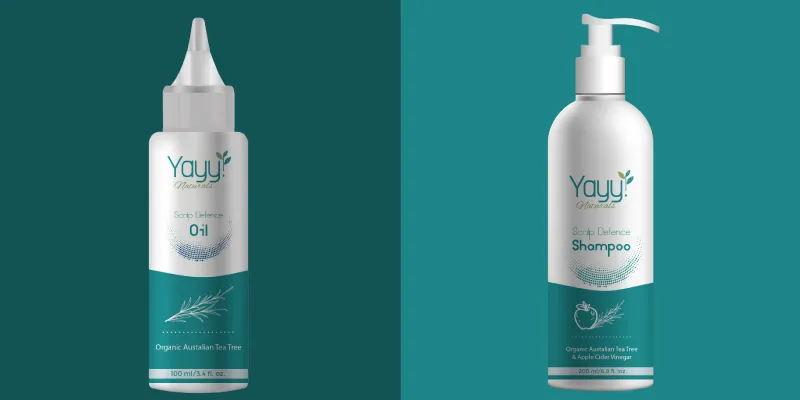This personal care brand is betting on D2C to grow almost 100 percent month on month
Yayy! Naturals was founded by Ashutosh Singh and Gaurav Singh in 2018. Despite COVID-19, the brand clocked sales worth Rs 2.5 lakh and Rs 4 lakh in June and July respectively and serves more than 1,000 customers every month.
India’s personal care industry is becoming increasingly crowded, and also increasing is the awareness of consumers who are becoming more concerned and conscious about what is going inside their bodies or on their skin and hair.
Ashutosh Singh and Gaurav Singh met each other while working in health and wellness startup Joybynature. During their stints as digital marketer and sales manager respectively, they realised that the profit margin in running a private firm was huge. Both left their jobs and started searching for new opportunities.

Ashutosh Singh, Co-founder, Yayy! Naturals
Ashutosh says this was also the time when companies like and were doing well. He observed that people in his office, who were mostly millennials, were not able to identify with the brands because of the added ‘mother’ factor and the way these companies marketed their products.
This was the eureka moment for Ashutosh and Gaurav. They decided to build a digital, Direct-to-Consumer (D2C) personal care brand for Gen Z, for which they wanted to have a name that resonates with this segment. A survey of 15 people led them to name their company .
Ashutosh says it took them a year and a half to put things together. During this period, they roped in nine vendors from different parts of the country, met potential manufacturers who could produce their products, and tried to understand the spirit and expectations of the youth.
The process of getting the product right was not easy.
“Sometimes, the fragrance was not right and sometimes dilution was not to the optimum. We had to spend many months with our manufacturer. In fact, there came a time when he very categorically said that our formulation could not be turned into a product. Finally, a few changes and certain permutations and combinations helped us through”.
The Delhi-based company was officially registered in August 2018 and went live with its website in March 2020.
Brand offerings
Yayy! Naturals kickstarted its operations by offering products in the haircare segment. Ashutosh says that shampoos are sold out the most, followed by conditioners, hair oil, hair serum and hair masks. The company is also planning to venture into the skincare sector by introducing face washes next month. “The manufacturers have the raw materials and the work will start soon,” Ashutosh says.
The brand is also planning to venture into the oral care space. The strategy is to come up with a new product every 30 days.
Currently, the company is outsourcing the manufacturing of its products to units based out of Delhi. It says it wants to have its own manufacturing unit in the long run.

Oil and Shampoo by Yayy! Naturals
Making an Indian D2C brand
Yayy! Naturals is betting on D2C to establish itself in the personal care space for various reasons. Firstly, Ashutosh says he wants to remain connected with the customers from the beginning.
“Other players who sell their products through Amazon or other marketplaces are able to scale quickly. But if 60 to 70 percent of their sales are happening through marketplaces, it means they are not getting enough data or feedback from the customers.”
In addition, the company wants to create ‘stickiness’ with its customers by creating a lot of content on social media platforms.
“Millennials don’t stick with brands, they stick with a cause, which in our case is to make the products in a sustainable manner. Our products are free from chemicals like paraben and SLS and we are looking at getting a certification from People for the Ethical Treatment of Animals (PETA),” says Ashutosh.
He says the company has invested a good amount of money in building its website, and invested in SEO and paid ads to get initial traction on the website. It is also planning to get listed on Amazon and next month.
Premium versus affordability
The personal care segment in India is projected to reach $4,241 million in revenue by 2024, according to research platform Statista. India is a booming industry for this sector.
It houses multiple brands. Some of the big names are Dabur, Colgate, Lux, Lakme, and Gillette and some of the well-known brands that have grown over the years include Mamaearth, Wow Skin Science, etc.
The products offered by Yayy! Naturals are priced between Rs 349-Rs 600. The shampoos and hair oil cost between Rs 349-Rs 399. Hair serum and hair mask are priced slightly higher.
Ashutosh says currently the company is not focussing on establishing itself as a premium brand.
“Brands that call themselves premium get false positives in the initial phase when they get orders from metro cities like New Delhi and Mumbai. They face problems when they want to scale because the purchasing power in India is low.”
“Our aim is to capture a large market share in the long run and so we avoid taking luxury or super-premium pricing,” he adds.
The company says it wants to bring down the price of their products so as to enter the Tier 2, Tier 3 and Tier 4 markets and are trying to work around a strategy.
“We are evaluating if some premium ingredients which we add are adding any value and if they are not, we will remove them and bring down the price further,” he says.
The road ahead
The COVID-19 pandemic has impacted the company’s operations. The supply of pumps and bottles that came from China has taken a hit. The co-founders are trying to mitigate the crisis by looking for Indian manufacturers who can meet the demand.
This is not going to be easy as China’s manufacturing ecosystem is much more evolved and India is still working its way up. “In China, if a bottle costs Rs 5, the same will cost Rs 15 in India and the time taken to mass produce them in the neighbouring country is also much lesser,” he says.
However, despite COVID-19, the company has managed to grow almost 100 percent month-on-month. It closed sales worth Rs 2.5 lakh in the month of June, Rs 5 lakh in July and plans to close August with an equally good number. It closed sales worth Rs 3.2 lakh by mid-August.
The brand serves more than 1,000 customers every month and claims to have a repeat customer percentage of 45 percent.
The bootstrapped company is also planning to raise funding. However, the co-founders say they first want to reach the target of Rs 50 lakh in revenue every month.
Edited by Javed Gaihlot









